Labrador Retriever Puppy Socialization Made Easy: Proven Strategies for Happy Tail Wagging
Hello, Labrador lovers today I will explain in detail about How to Socialize Labrador Retriever Puppy.
Labrador Retriever puppies are some of the most adorable and beloved dogs around. They’re known for their friendly personalities, boundless energy, and loyal companionship. These pups have a special place in many families’ hearts because of their loving nature and eagerness to please.

Labrador Retrievers are a breed that originated in Newfoundland, Canada, where they were originally used for retrieving fishing nets and hauling in fish from the cold waters. Over time, they became popular hunting companions due to their excellent retrieving skills and strong work ethic.
Hello everyone who loves dogs! I’m Dr. Arif Aziz, and I’ve been taking care of pets especially dogs at my clinic for a long time, exactly 14 years! I’m here to share some valuable information with you that I’ve gathered from books during my study time written by experts in veterinary medicine (DVM) and MSC (Master of Science), as well as from my own experiences working with dogs.
Characteristics of Labrador Retriever Puppies:
Labrador Retriever puppies are typically characterized by their sturdy build, short coat, and friendly expression. They usually have a medium to large size, with males generally being larger than females. Their coats come in three standard colors: black, yellow, and chocolate.
These puppies are known for their playful and outgoing personalities. They’re often described as being “people pleasers,” meaning they love to make their owners happy and are usually eager to learn new things. Labrador Retriever puppies are also known for their intelligence, which makes them highly trainable and adaptable to various environments.
Importance of Early Socialization:
Early socialization is incredibly important for Labrador Retriever puppies. During the first few months of their lives, puppies are like sponges, soaking up new experiences and forming lasting impressions. This critical period, usually between 3 to 16 weeks of age, is when puppies are most receptive to new people, animals, and environments.
Socialization helps Labrador Retriever puppies become well-adjusted and confident adult dogs. By exposing them to different people, animals, sights, sounds, and environments early on, you’re helping them build positive associations and develop the social skills they need to navigate the world around them.
Without proper socialization, Labrador Retriever puppies may become fearful, anxious, or even aggressive towards unfamiliar people or situations. They may struggle to adapt to new environments or experiences, which can lead to behavioral issues later in life.
In summary, early socialization is crucial for Labrador Retriever puppies to grow into happy, well-behaved adult dogs. By providing them with positive experiences and exposure to various stimuli from a young age, you’re setting them up for success and ensuring they become confident, friendly, and well-rounded companions for years to come.
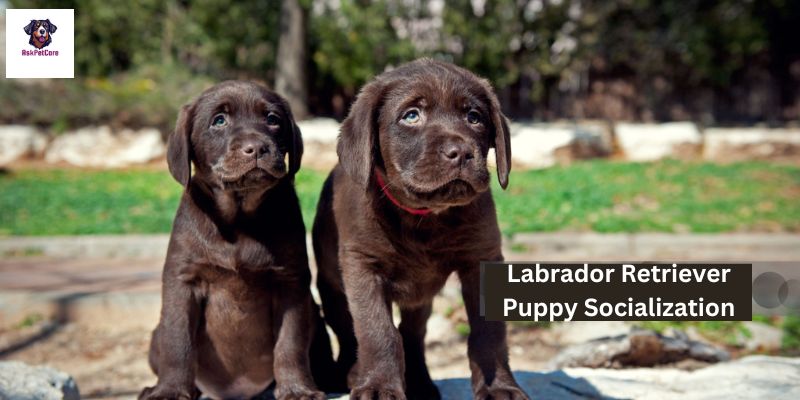
Understanding Socialization:
Socialization is a vital process for puppies that involves exposing them to a wide range of experiences, people, animals, and environments in a positive and controlled manner. It’s like giving them a crash course in the world around them, helping them learn how to interact with different stimuli and develop important life skills.
Definition of Socialization in Puppies:
In simple terms, socialization for puppies is all about teaching them how to be comfortable and confident in different situations. It’s like introducing them to the big, wide world and showing them that it’s nothing to be afraid of. Socialization involves exposing puppies to various people, including children, adults, and strangers, as well as other animals, different sounds, sights, and places.
Critical Period for Socialization in Puppies (3 to 16 weeks):
The critical period for socialization in puppies is like a golden window of opportunity. It usually starts when puppies are around 3 weeks old and lasts until they’re about 16 weeks old. During this time, puppies are like little sponges, soaking up everything around them and forming lasting impressions that will shape their behavior and temperament for the rest of their lives.
Think of it as a time when puppies are most open to new experiences and are eager to learn about the world. Just like human babies learn the most during their early years, puppies learn a ton during this critical period. That’s why it’s so important to expose them to as many positive experiences as possible during these crucial weeks.
By socializing puppies during this critical period, you’re helping them become well-adjusted, confident, and friendly adult dogs. They’ll learn how to interact with people and other animals, navigate different environments, and handle new situations with ease. Plus, they’ll be less likely to develop fears or behavioral problems later in life.
In summary, socialization for puppies is all about giving them the tools they need to thrive in the world around them. By exposing them to new experiences and situations during the critical period from 3 to 16 weeks old, you’re setting them up for a lifetime of happiness and success.
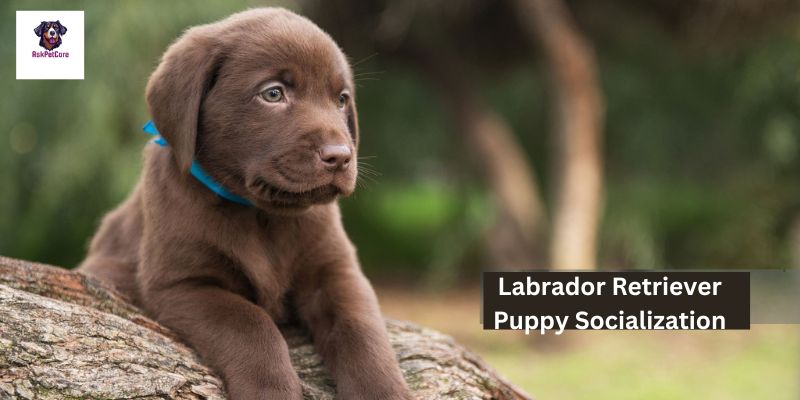
Benefits Of Socialization For Labrador Retrievers:
Socialization is like a superpower for Labrador Retrievers, helping them grow into well-rounded and happy adult dogs. Here’s a closer look at some of the amazing benefits that socialization provides:
- Improved Behavior and Temperament: Socialization teaches Labrador Retrievers how to behave appropriately in different situations. By exposing them to a variety of people, animals, and environments from a young age, you’re helping them learn how to interact politely and calmly. This means they’ll be less likely to jump on people, bark excessively, or exhibit other undesirable behaviors when they encounter something new.
- Reduced Fear and Anxiety: Labrador Retrievers are known for their friendly and outgoing personalities, but without proper socialization, they can become fearful or anxious in unfamiliar situations. Socialization helps them build confidence and resilience, so they’re less likely to be scared of new people, places, or experiences. Instead of cowering or hiding, a well-socialized Labrador Retriever is more likely to approach new things with curiosity and confidence.
- Better Adaptation to Various Environments and Situations: Life is full of surprises, and socialization prepares Labrador Retrievers to handle whatever comes their way. Whether it’s a trip to the park, a visit to the vet, or a family gathering, a well-socialized Labrador Retriever is more likely to adapt quickly and comfortably to different environments and situations. This means less stress for both the dog and their owner, and more opportunities for fun and adventure together.
In essence, socialization is like giving Labrador Retrievers the tools they need to navigate the world with ease and confidence. By exposing them to new experiences and teaching them how to interact positively with people, animals, and environments, you’re setting them up for a lifetime of happiness and success. So don’t underestimate the power of socialization – it’s one of the best gifts you can give your Labrador Retriever puppy!
Key Socialization Activities Exposure to different people (all ages, genders, and races). Interaction with other animals (dogs, cats, etc.).
Key Socialization Activities For Labrador Retriever Puppies:
Exposure to Different People (All Ages, Genders, Races):
Labrador Retriever puppies should meet a wide variety of people to feel comfortable and confident around everyone. This includes men, women, children, and people of different races. Introduce your puppy to friendly strangers in a safe and controlled environment, such as your home or a quiet park. Encourage gentle interactions and positive experiences, like offering treats or praise when your puppy approaches someone new.
Interaction with Other Animals (Dogs, Cats, etc.):
Socializing with other animals teaches Labrador Retriever puppies how to communicate and play nicely with their furry friends. Arrange playdates with well-behaved dogs and cats, ensuring they’re up-to-date on vaccinations and are friendly towards puppies. Start with calm and gentle introductions, allowing the animals to sniff each other and interact at their own pace. Supervise all interactions to prevent any rough play or aggression.
Introduction to Various Environments (Parks, Streets, Indoors):
Labrador Retriever puppies should feel comfortable exploring different environments, both indoors and outdoors. Take your puppy for walks in the neighborhood, visits to the park, and outings to pet-friendly stores. Gradually expose them to new sights, sounds, and smells, allowing them to investigate at their own pace. Use treats and praise to reinforce positive experiences and build confidence in unfamiliar surroundings.
Familiarization with Different Sounds (Traffic, Thunder, Vacuum Cleaner):
Labrador Retriever puppies need to learn that common household noises and outdoor sounds are nothing to fear. Start by playing recordings of various sounds, such as traffic, thunderstorms, doorbells, and vacuum cleaners, at a low volume. Pair each sound with something positive, like treats or playtime, to create positive associations. Gradually increase the volume as your puppy becomes more comfortable, ensuring they remain calm and relaxed.
Introduction to Various Objects (Umbrellas, Bicycles, Vacuum Cleaners):
Labrador Retriever puppies should be exposed to different objects to prevent fear or anxiety around them. Introduce your puppy to common household items, outdoor equipment, and everyday objects they may encounter in their environment. Allow them to sniff, explore, and interact with each object at their own pace, using treats and praise to reinforce positive behavior. Encourage curiosity and confidence by making each interaction a fun and rewarding experience.
By incorporating these key socialization activities into your Labrador Retriever puppy’s routine, you’ll help them become well-adjusted, confident, and friendly adult dogs. Remember to be patient, positive, and consistent throughout the socialization process, and always prioritize your puppy’s safety and well-being.
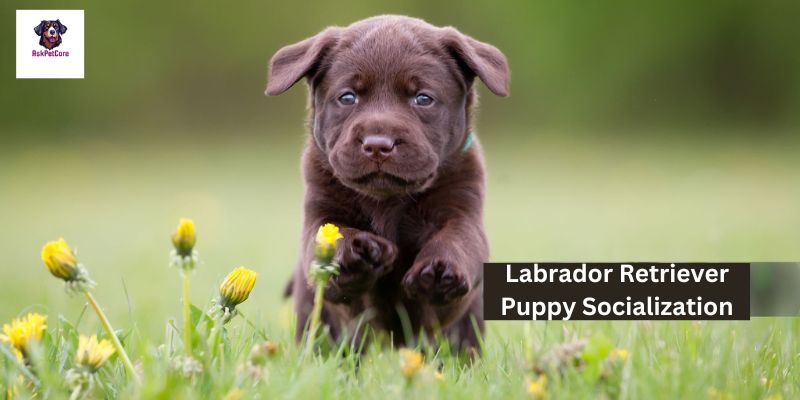
Tips For Successful Socialization Of Labrador Retriever Puppies:
Start Early but Proceed Gradually:
Begin socializing your Labrador Retriever puppy as soon as you bring them home, ideally between 8 and 12 weeks of age. However, introduce new experiences gradually to prevent overwhelming your puppy. Start with calm and familiar environments, then gradually expose them to new people, animals, and environments as they become more comfortable and confident.
Use Positive Reinforcement Techniques:
Positive reinforcement is the key to successful socialization. Whenever your puppy encounters something new or behaves in a desirable way, such as approaching a new person calmly or playing nicely with another dog, reward them with treats, praise, or playtime. This teaches your puppy that positive experiences result in good things, encouraging them to repeat those behaviors in the future.
Monitor Body Language for Signs of Stress or Discomfort:
Pay close attention to your puppy’s body language during socialization outings. Signs of stress or discomfort may include cowering, trembling, excessive panting, tucked tail, or avoidance behaviors. If you notice any of these signs, it’s important to intervene and remove your puppy from the situation to prevent them from becoming overwhelmed or frightened.
Respect the Puppy’s Limits and Don’t Force Interactions:
Every puppy is unique, and some may be more outgoing or reserved than others. It’s essential to respect your puppy’s individual temperament and comfort level during socialization. If your puppy seems hesitant or fearful, don’t force them to interact with people, animals, or environments that make them uncomfortable. Instead, allow them to approach new experiences at their own pace, offering reassurance and support as needed.
Enroll in Puppy Socialization Classes:
Puppy socialization classes provide structured environments where puppies can interact with other dogs and people under the guidance of experienced trainers. These classes offer valuable opportunities for socialization in a controlled setting, allowing puppies to learn appropriate social skills and behaviors while having fun. Look for classes that focus on positive reinforcement methods and provide plenty of opportunities for supervised play and socialization.
By following these tips for successful socialization, you’ll help your Labrador Retriever puppy develop into a confident, well-adjusted adult dog who’s comfortable and friendly in any situation. Remember to be patient, consistent, and supportive throughout the socialization process, and celebrate each small milestone your puppy achieves along the way.
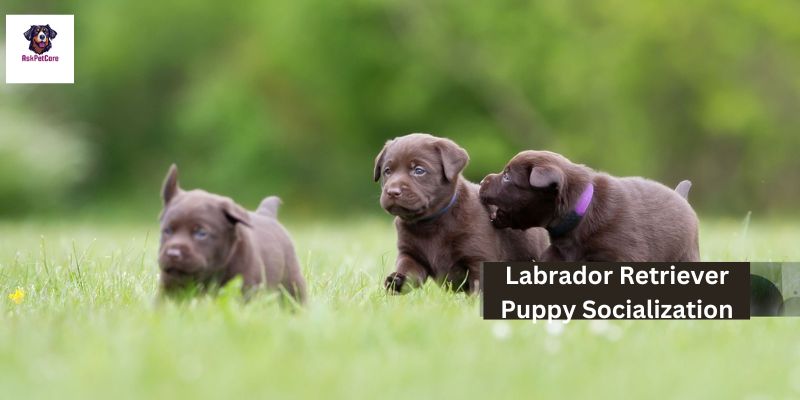
Common Mistakes To Avoid In Labrador Retriever Puppy Socialization:
Exposing the Puppy to Too Much, Too Soon:
It’s tempting to want to introduce your Labrador Retriever puppy to everything and everyone right away, but overwhelming them with too many new experiences can backfire. Puppies have sensitive nervous systems, and exposing them to too much too soon can lead to fear, anxiety, and even behavioral issues. Instead, introduce new experiences gradually, starting with familiar environments and gradually increasing the level of novelty as your puppy becomes more confident and comfortable.
Using Punishment or Negative Reinforcement During Socialization:
Punishment or negative reinforcement techniques, such as scolding or physical corrections, can have detrimental effects on your puppy’s socialization experience. Using fear or force to control your puppy’s behavior can erode trust and confidence, making them more fearful and less willing to engage in social interactions. Instead, focus on positive reinforcement methods, such as treats, praise, and play, to encourage desired behaviors and build a strong bond based on trust and respect.
Overlooking the Importance of Ongoing Socialization Beyond Puppyhood:
Socialization isn’t something that stops once your Labrador Retriever puppy reaches a certain age. It’s an ongoing process that continues throughout their lifetime. Failure to provide opportunities for continued socialization beyond puppyhood can result in regression or missed opportunities for growth and development. Make socialization a regular part of your dog’s routine by exposing them to new experiences, environments, and interactions on a consistent basis, even as they mature into adulthood.
In summary, avoid the common mistakes of overwhelming your puppy with too many new experiences, using punishment or negative reinforcement, and neglecting ongoing socialization beyond puppyhood. Instead, take a gradual and positive approach to socialization, focusing on building your puppy’s confidence and trust while providing opportunities for growth and learning throughout their life. By avoiding these mistakes and prioritizing positive, ongoing socialization, you’ll help your Labrador Retriever develop into a well-adjusted, friendly, and confident companion.
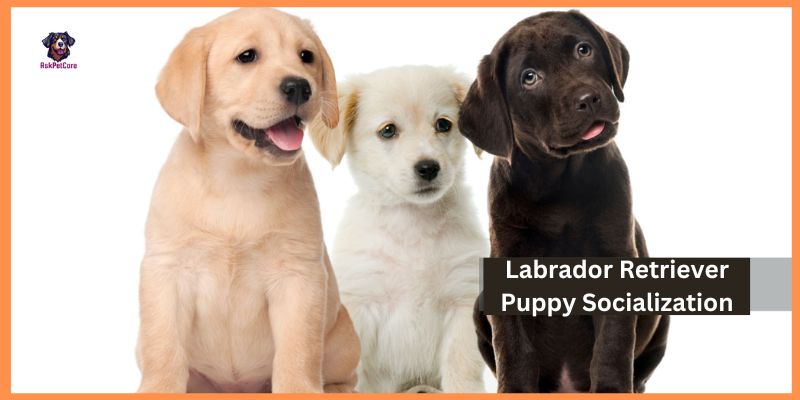
Troubleshooting Socialization Challenges In Labrador Retriever Puppies:
Fearfulness or Anxiety in New Situations:
It’s not uncommon for Labrador Retriever puppies to feel scared or anxious in new situations or environments. To help your puppy overcome fearfulness or anxiety, start by identifying the specific triggers that cause their discomfort. Once you know what they’re afraid of, you can gradually introduce them to those triggers in a controlled and positive manner. Use treats, praise, and encouragement to create positive associations with the things that scare them, and always move at your puppy’s pace. With patience and consistency, you can help your puppy build confidence and overcome their fears.
Aggression Towards People or Other Animals:
Aggression in Labrador Retriever puppies can be concerning, but it’s important to address it promptly and appropriately. Aggression can stem from fear, frustration, or a lack of socialization, so it’s essential to identify the underlying cause. Consult with a professional dog trainer or behaviorist to develop a behavior modification plan tailored to your puppy’s specific needs. Avoid punishment or harsh methods, as these can exacerbate aggression and erode trust. Instead, focus on positive reinforcement techniques to encourage calm and appropriate behavior around people and other animals.
Lack of Confidence in Certain Environments:
If your Labrador Retriever puppy lacks confidence in certain environments, it’s crucial to provide them with opportunities for positive experiences and gradual exposure. Start by introducing your puppy to the environment in small doses, using treats, toys, and praise to build their confidence. Gradually increase the level of challenge as your puppy becomes more comfortable, but always respect their limits and avoid pushing them too far too fast. With patience and encouragement, you can help your puppy develop the confidence they need to navigate different environments with ease.
In summary, troubleshooting socialization challenges in Labrador Retriever puppies requires patience, consistency, and a positive approach. By identifying the specific challenges your puppy is facing and addressing them with appropriate techniques, you can help them overcome fearfulness, aggression, or lack of confidence and become a well-adjusted and confident adult dog. If you’re unsure how to address these challenges on your own, don’t hesitate to seek guidance from a professional dog trainer or behaviorist who can provide personalized support and advice.
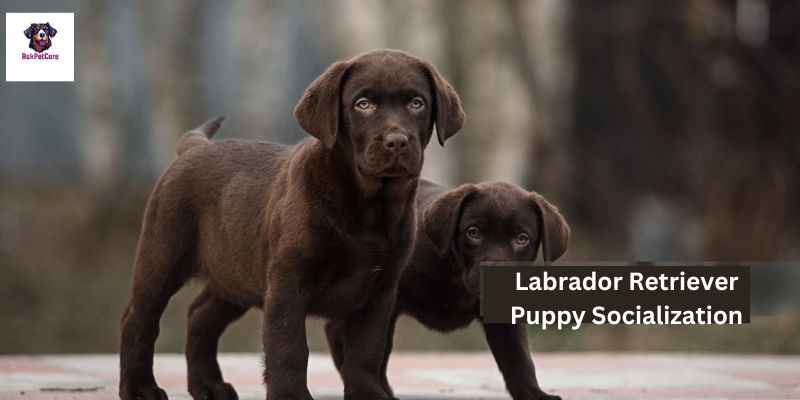
How To Socialize Labrador Retriever Puppy?
Socializing a Labrador Retriever puppy is an essential part of their upbringing and sets the foundation for their behavior and temperament as adults. Here’s a step-by-step guide on how to socialize a Labrador puppy in simple terms:
Start Early:
Begin socializing your Labrador Retriever puppy as soon as you bring them home, ideally between 8 to 12 weeks of age. This is when they are most receptive to new experiences and learning.
Expose Them Gradually:
Introduce your puppy to new experiences, people, animals, and environments gradually. Start with familiar settings, like your home or backyard, before gradually expanding to more public places.
Positive Experiences:
Ensure that all socialization experiences are positive and enjoyable for your puppy. Use treats, toys, and praise to reward them for calm and confident behavior.
Meet Different People:
Introduce your puppy to a variety of people of different ages, genders, races, and appearances. This includes family members, friends, neighbors, and strangers. Encourage gentle interactions and positive experiences with each person.
Interact with Other Animals:
Arrange playdates with other well-socialized dogs and cats, ensuring they are up-to-date on vaccinations and friendly towards puppies. Monitor their interactions closely and intervene if necessary to prevent rough play or aggression.
Explore Various Environments:
Take your puppy for walks in different environments, such as parks, streets, and pet-friendly stores. Allow them to sniff, explore, and become familiar with new sights, sounds, and smells.
Familiarize with Different Sounds:
Expose your puppy to various sounds they may encounter in everyday life, such as traffic, thunderstorms, doorbells, vacuum cleaners, and fireworks. Play recordings of these sounds at a low volume initially and gradually increase the volume as your puppy becomes more comfortable.
Introduce to Different Objects:
Let your puppy interact with a variety of objects they may encounter in their environment, such as umbrellas, bicycles, strollers, and household appliances. Allow them to sniff, investigate, and become comfortable with each object at their own pace.
Puppy Socialization Classes:
Enroll your puppy in puppy socialization classes led by experienced trainers. These classes provide structured opportunities for socialization with other puppies and guidance on proper behavior and interactions.
Be Patient and Consistent:
Socialization takes time and patience, so be consistent in your efforts and celebrate each small milestone your puppy achieves. Always prioritize your puppy’s safety and well-being during socialization outings.
By following these steps and providing plenty of positive experiences and exposure to new people, animals, environments, and stimuli, you’ll help your Labrador Retriever puppy grow into a confident, well-adjusted, and friendly adult dog.
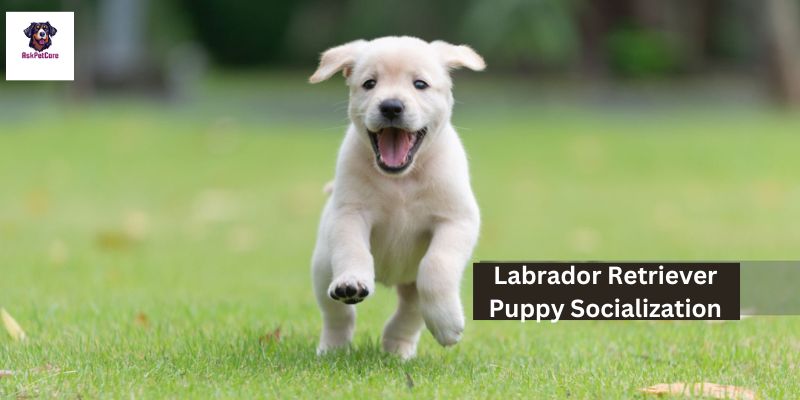
How Do I Bond With My Lab Puppy?
Bonding with your Labrador Retriever puppy is an important part of building a strong and trusting relationship that will last a lifetime. Here are some simple ways to bond with your lab puppy:
- Spend Quality Time Together: Spend time with your lab puppy every day, engaging in activities that you both enjoy. This could include playing games, going for walks, or simply cuddling on the couch. The more time you spend together, the stronger your bond will become.
- Establish Routine: Establishing a routine can help your lab puppy feel safe and secure. Set consistent mealtimes, potty breaks, and playtimes so your puppy knows what to expect each day. This routine will also help you build trust and understanding with your puppy.
- Use Positive Reinforcement: Use positive reinforcement techniques, such as treats, praise, and affection, to reward your lab puppy for good behavior. This will help them associate you with positive experiences and strengthen your bond.
- Training Sessions: Training sessions are not only an opportunity to teach your lab puppy important skills, but also a chance to bond with them. Use positive, reward-based training methods to build trust and cooperation. Keep training sessions short and fun to keep your puppy engaged and interested.
- Physical Contact: Physical contact is an important way to bond with your lab puppy. Spend time petting, grooming, and snuggling with them to strengthen your connection. Physical touch releases feel-good hormones for both you and your puppy, reinforcing your bond.
- Explore Together: Take your lab puppy on adventures and explore new places together. Whether it’s a walk in the park, a hike in the woods, or a trip to the beach, experiencing new sights, sounds, and smells together will help strengthen your bond.
- Playtime: Playtime is not only fun for your lab puppy but also a great way to bond with them. Use toys to engage in interactive games like fetch, tug-of-war, or hide-and-seek. Be sure to match the intensity of play to your puppy’s age and energy level.
- Be Patient and Understanding: Building a bond with your lab puppy takes time and patience. Be patient with them as they learn and grow, and always approach interactions with understanding and compassion. Your lab puppy will appreciate your patience and respond positively to your love and care.
By incorporating these simple tips into your daily routine, you’ll strengthen the bond between you and your lab puppy and lay the foundation for a happy and fulfilling relationship. Remember to be consistent, patient, and loving, and your bond will continue to grow stronger with each passing day.
How Can I Improve My Dog’s Socialization?
Improving your dog’s socialization skills is a rewarding journey that requires patience, consistency, and positive reinforcement. Here’s how you can enhance your dog’s socialization in simple terms:
- Start Early: If your dog is still young, start socializing them as soon as possible. The earlier you begin, the easier it is for them to adapt to new experiences and interactions.
- Expose Them Gradually: Introduce your dog to new people, animals, environments, and stimuli gradually. Start with familiar settings and gradually increase the level of novelty as your dog becomes more comfortable and confident.
- Use Positive Reinforcement: Positive reinforcement is key to improving your dog’s socialization skills. Whenever your dog interacts positively with people, animals, or environments, reward them with treats, praise, or playtime. This will help them associate socialization with positive experiences.
- Practice Regularly: Make socialization a regular part of your dog’s routine. Take them for walks in different environments, arrange playdates with other dogs, and expose them to various sights, sounds, and smells on a consistent basis.
- Be Patient and Supportive: Building socialization skills takes time and patience, so be patient with your dog as they learn and grow. Encourage them with praise and support, and don’t rush or force interactions if they seem hesitant or fearful.
- Monitor Body Language: Pay close attention to your dog’s body language during socialization outings. Look for signs of stress or discomfort, such as trembling, panting, or avoidance behaviors. If you notice any signs of anxiety, remove your dog from the situation and try again later at a slower pace.
- Provide Safe Spaces: Give your dog access to safe spaces where they can retreat if they feel overwhelmed or anxious. This could be a crate, a quiet room, or a designated area in your home where they feel secure.
- Seek Professional Help if Needed: If your dog struggles with socialization despite your efforts, don’t hesitate to seek help from a professional dog trainer or behaviorist. They can provide personalized guidance and support to help your dog overcome their socialization challenges.
- Stay Consistent: Consistency is key to improving your dog’s socialization skills. Continue to expose them to new experiences and interactions on a regular basis, and reinforce positive behaviors consistently.
- Celebrate Progress: Celebrate every small success your dog achieves during socialization outings. Whether it’s approaching a new person calmly or playing nicely with another dog, acknowledge and reward their progress to reinforce positive behavior.
By following these simple steps and providing your dog with plenty of positive experiences and support, you can improve their socialization skills and help them become more confident, friendly, and well-adjusted companions.
What Is The Best Way To Socialize A Puppy?
Socializing a puppy is a process that involves exposing them to a variety of experiences, people, animals, and environments in a positive and controlled manner. Here’s a detailed guide on the best way to socialize a puppy in simple terms:
- Start Early: Begin socializing your puppy as soon as you bring them home, ideally between 8 to 12 weeks of age. This is when puppies are most receptive to new experiences and learning.
- Gradual Exposure: Introduce your puppy to new experiences and environments gradually. Start with familiar settings, like your home or backyard, before gradually expanding to more public places.
- Positive Reinforcement: Use positive reinforcement techniques, such as treats, praise, and toys, to reward your puppy for calm and confident behavior during socialization. This helps them associate new experiences with positive outcomes.
- Meet Different People: Introduce your puppy to a variety of people of different ages, genders, races, and appearances. This includes family members, friends, neighbors, and strangers. Encourage gentle interactions and positive experiences with each person.
- Interact with Other Animals: Arrange playdates with other well-socialized dogs and cats, ensuring they are up-to-date on vaccinations and friendly towards puppies. Monitor their interactions closely and intervene if necessary to prevent rough play or aggression.
- Explore Various Environments: Take your puppy for walks in different environments, such as parks, streets, and pet-friendly stores. Allow them to sniff, explore, and become familiar with new sights, sounds, and smells.
- Familiarize with Different Sounds: Expose your puppy to various sounds they may encounter in everyday life, such as traffic, thunderstorms, doorbells, vacuum cleaners, and fireworks. Play recordings of these sounds at a low volume initially and gradually increase the volume as your puppy becomes more comfortable.
- Introduce to Different Objects: Let your puppy interact with a variety of objects they may encounter in their environment, such as umbrellas, bicycles, strollers, and household appliances. Allow them to sniff, investigate, and become comfortable with each object at their own pace.
- Puppy Socialization Classes: Enroll your puppy in puppy socialization classes led by experienced trainers. These classes provide structured opportunities for socialization with other puppies and guidance on proper behavior and interactions.
- Be Patient and Consistent: Building socialization skills takes time and patience, so be patient with your puppy as they learn and grow. Be consistent in your efforts and celebrate each small milestone your puppy achieves.
By following these steps and providing your puppy with plenty of positive experiences and exposure to new people, animals, environments, and stimuli, you’ll help them develop into a confident, well-adjusted, and friendly adult dog.
I hope you will thoroughly understand Labrador Retriever Puppy Socialization, if still any quarry contact me.
Here are some reference books that are considered authoritative on the topic of Labrador Retrievers:
- “The Labrador Handbook: The definitive guide to training and caring for your Labrador” by Pippa Mattinson.
- “The Everything Labrador Retriever Book: A Complete Guide to Raising, Training, and Caring for Your Lab” by Kim Campbell Thornton.
